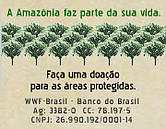
In the 1980s, the invasion of 40,000 Brazilian goldminers on Yanomami land brought with it what can only be described as genocide. Twenty per cent of the Yanomami population died in just seven years.
The tribe were shot at and physically attacked, their villages destroyed. Many died from introduced diseases to which they had no immunity, such as malaria, tuberculosis and flu. Mercury effluents from mining poisoned their rivers, killing fish and polluting the Yanomami’s water supply. No longer able to produce food, the tribe had to beg.
In response to this crisis, Survival International and its supporters wrote letters, held regular and relentless protests outside embassies in 20 different countries and raised vital funds for medical aid. The result of this long international campaign, and a national campaign in Brazil led by the Pro Yanomami Commission (CCPY), was the creation of the Yanomami Park in 1992. This milestone saw the eviction of illegal miners and recognition of the tribe’s right to live on their land.
Without this huge groundswell of public support and the subsequent creation of the reserve, the Yanomami would not exist as a people today. It is also certain that without Survival’s campaign the territory would not have been created. As Davi Kopenawa, a spokesperson for the tribe told Survival, “If you hadn’t been born, we indigenous people would be dead.”
Davi now leads the Yanomami’s own organization, Hutukara, which was formed in 2004. Speaking at the recent assembly, he said, “I dreamed a lot and I fought for 25 years—it was very difficult, but others helped me. It was a good victory for the Yanomami people. If I hadn’t fought, I wouldn’t be here.”
However, among the cheer and celebration of the assembly, was a shadow. One of the key issues debated was the draft law on mining, which if approved will open up indigenous territories for large-scale mining. One Yanomami warned that “a big snake is coming,” and Davi declared, “Mining is not good and will not bring benefits to the Yanomami. It will bring fighting and diseases.”

Yanomami from Venezuela showed graphic photos of the impacts of mining on communities there, which are suffering from high levels of disease and contamination because the government has done little to tackle the problems.
The assembly proved that the Yanomami tribe can survive even when pushed to the brink—and that it has the collective determination to endure. But crucially, it shows us what is at stake, and how imperative it is to champion their rights by defending their hard-fought victory 20 years ago.
The Yanomami Park remains the world’s largest indigenous territory. It contains an abundance of flora and fauna, and a people whose only wish is to be left to live sustainably within it. Sadly, illegal goldmining violates this human right on a daily basis. Act now to help the Yanomami in their fight to put the lives of their families and children ahead of the short-term greed of illegal miners.
Cf. MORE: Do Tribal People Have a Future? Exclusive Q&A
fonte




































 Monitoramento da Floresta Amazônica Brasileira por Satélite - PRODES
Monitoramento da Floresta Amazônica Brasileira por Satélite - PRODES Sistema de Detecção de Desmatamento em Tempo Real - DETER
Sistema de Detecção de Desmatamento em Tempo Real - DETER

0 comentários:
Enviar um comentário